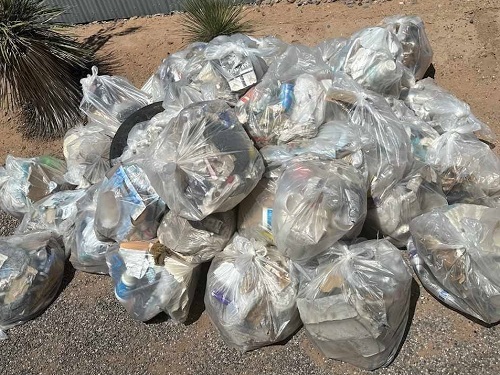The New Mexico Department of Transportation has launched a new grant program to support the development and implementation of local beautification programs, especially for roadway trash removal efforts.
[Above photo by NMDOT]
“The goal of the program is to increase litter pickup in every community, as well as build a culture throughout our state that eliminates littering,” said Ricky Serna, NMDOT secretary, in a statement. “Litter across New Mexico’s roads is hiding the natural beauty of our state and we all can do better.”
New Mexico municipalities, counties, tribal communities, and entities of government in good standing with the New Mexico Taxation and Revenue Department may apply for the funding, the agency noted.
NMDOT said local governments will be eligible to receive up to $200,000 per award, with this grant program able to support 15 to 20 total awardees in its inaugural year.
The agency added that it expects recipients to receive 100 percent of their grant funding following the execution of the grant agreement and submission of their plan, as it relates to the program goals.
Awardees will receive a year of funding for a coordinator position and supportive budget expenses, the agency said, with the coordinator responsible for designing and implementing a local beautification program. NMDOT stressed that local beautification initiatives receiving grants must follow the agency’s “Que Linda” beautification toolkit, which outlines 11 types of beautification endeavors that are eligible for grant funds under this new program.
Other state departments of transportation across the country are involved in similar efforts to jump-start local litter removal and related beautification efforts.
For example, in October 2023, cities and local agencies throughout California received $114.5 million in grants to help fund 60 litter removal as well as neighborhoods and public space beautification projects.
That funding includes $14.5 million set aside specifically to support 18 projects for cleaning transit stations and other areas around the state’s public transportation systems.
Those grants represent the latest round of funding from the “Clean California” initiative; a sweeping billion-dollar multi-year clean-up effort led by the California Department of Transportation, known as Caltrans, to remove trash and help to revitalize public spaces in local communities statewide.
Meanwhile, in February 2023, the Washington State Department of Transportation – in coordination with the city of Des Moines – provided a “much-needed makeover” to a popular 14-acre green space along Barnes Creek; an area used by local residents for a variety of outdoor activities.
The agency described this particular green space in a blog post as a “well-loved unofficial neighborhood trail” where people are often seen walking their dogs, running, or enjoying nature with their families.
This natural corridor includes a series of wetlands along Barnes Creek that have been degraded over time by invasive plants.
Back on the East Coast, the Tennessee Department of Transportation celebrated the 40th anniversary of its “Litter Grant Program” in July 2023. That program – started in 1983 – provides funding to all 95 counties within the state to pay for a wide variety of litter-related efforts, such as litter and tarp law enforcement; cleanup and recycling events; and litter prevention education campaigns.
Those funds also help county governments participate in multijurisdictional and statewide collaborations with Tennessee DOT’s “Nobody Trashes Tennessee” litter prevention campaign, conducted jointly with Keep Tennessee Beautiful and its local affiliates.
Collectively, the agency’s litter grant program is responsible for removing an average of 11,243 tons of roadway trash annually and, in 2022 alone, nearly 29 percent of that statewide total was diverted from landfills and recycled. Additionally, 3,480 illegal dumpsites were cleaned up. All told, more than 435,529 tons of litter have been removed from Tennessee roadways since the program’s inception four decades ago, Tennessee DOT said.
The program’s impact is further amplified through local government partners that invest additional resources in trash cleanup and removal, as well as by individuals who contribute tens of thousands of volunteer hours. This makes the program extremely efficient, saving communities and the state critical funds when compared to the costs of contracted litter pickup.

